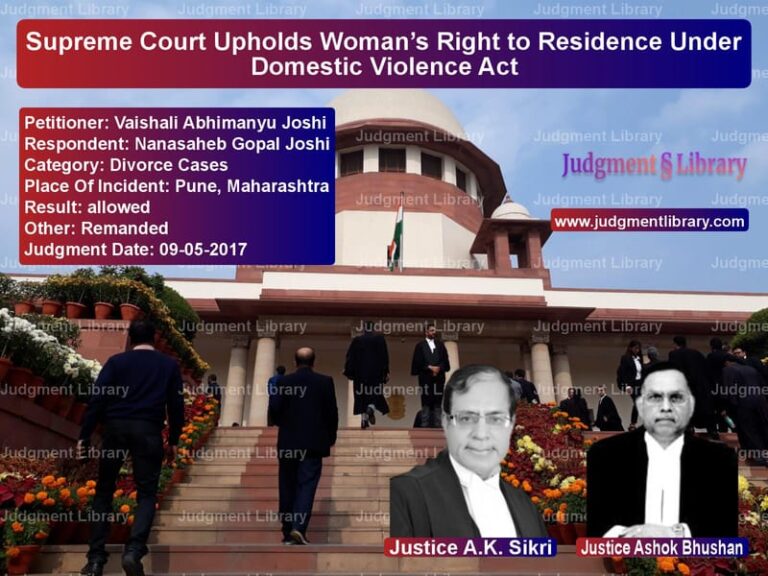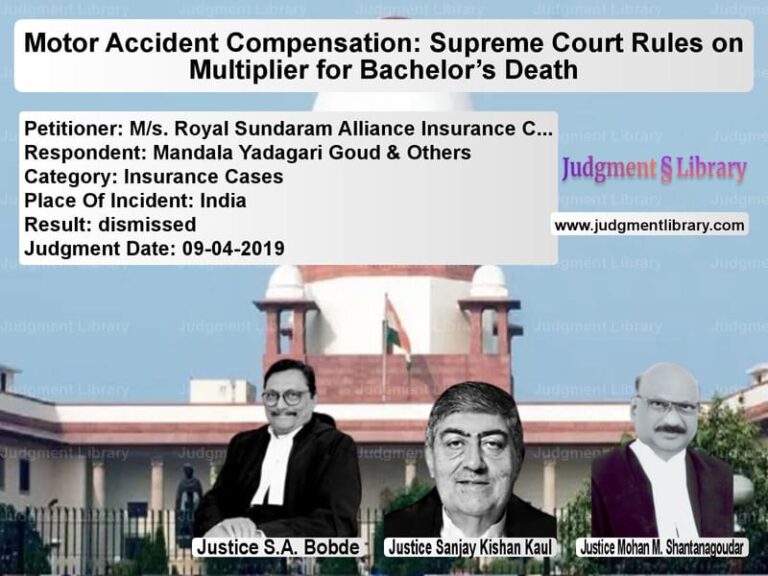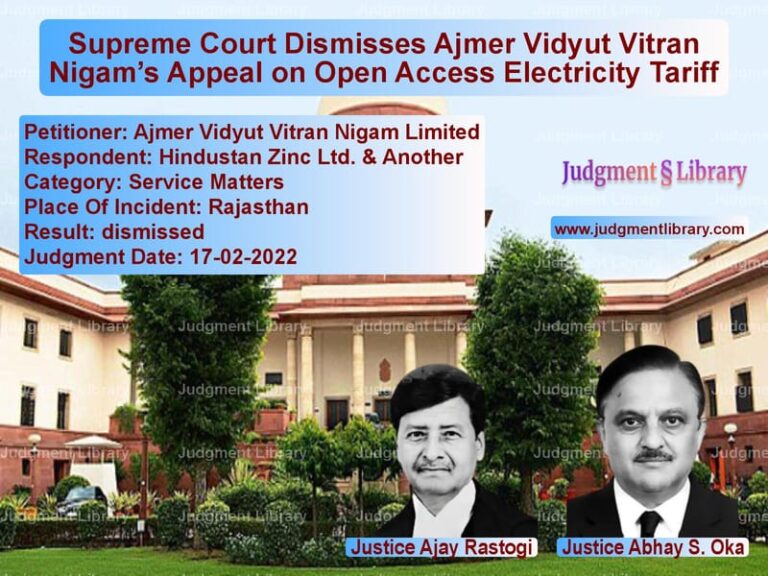Property Dispute and Injunction Rights: A. Subramanian vs. R. Pannerselvam
The case of A. Subramanian & Another vs. R. Pannerselvam is a significant judgment in property disputes and the right to seek injunctions. This case revolved around the rightful possession of a property and the legal standing of the plaintiff’s claim. The Supreme Court had to determine whether the plaintiff, despite disputes regarding title, was entitled to protection from dispossession.
Background of the Case
The case originated from a suit filed by the plaintiff, R. Pannerselvam, seeking a permanent injunction against the defendants, A. Subramanian and another, to prevent them from interfering with his possession of the suit property. The plaintiff claimed that he had purchased the property from the legal heirs of the original owner, Dhasi Naidu, through a registered sale deed dated 16.07.2001. The defendants, however, contested the plaintiff’s title, arguing that the sale deed was fabricated and that the purported legal heirs were fictitious.
The trial court ruled in favor of the plaintiff, granting the injunction. The first appellate court reversed the decision, finding that the plaintiff had not established a clear title. The High Court, however, reinstated the trial court’s ruling, emphasizing that possession was sufficient for granting an injunction. The matter was then brought before the Supreme Court.
Key Legal Issues
- Whether the plaintiff had valid title to the property.
- Whether possession alone was sufficient to grant an injunction.
- The impact of prior litigation on the rights of the parties.
Arguments by the Appellants (Defendants)
- The defendants contended that the plaintiff’s sale deed was invalid as it was executed based on a fraudulent power of attorney.
- They argued that the plaintiff could not succeed in the suit solely on the basis of possession if title was in dispute.
- The defendants relied on previous cases to assert that a plaintiff seeking injunction must also establish title.
Arguments by the Respondent (Plaintiff)
- The plaintiff argued that he was in settled possession of the property, which was sufficient to seek an injunction.
- He relied on prior litigation where the defendants had failed to establish their title to the property.
- The plaintiff asserted that the sale deed was validly executed by the legal heirs of the original owner.
Supreme Court’s Analysis
The Supreme Court examined whether possession alone could be a basis for granting an injunction. The Court noted:
- “The High Court has rightly observed that a bare perusal of the plaint would demonstrate that the plaintiff has not narrated anything about the title dispute obviously because of the fact that in the previous litigation, DW1 failed to obtain any relief.”
- “It is a common principle of law that even a trespasser, who is in established possession of the property, could obtain an injunction.”
- “The possession of the plaintiff was upheld by the High Court on two main reasons: (1) The defendant had previously filed a suit for recovery of possession and declaration for the same property, which was dismissed. (2) The defendant in his cross-examination admitted that the plaintiff had demolished the old structure and was in possession.”
The Court also referenced established legal principles:
- “Possession is good against all but the true owner. If the true owner does not assert their rights within the limitation period, the possessory owner acquires an absolute title.” (Citing the Judicial Committee decision in Parry v. Clissold (1907) AC 73).
- “In a suit for declaration of title and possession, the plaintiffs must succeed on the strength of their own title and not on the weakness of the defendant’s case.” (Citing Jagdish Prasad Patel vs. Shivnath, (2019) 6 SCC 82).
Final Judgment
The Supreme Court upheld the High Court’s ruling and dismissed the appeal. The Court concluded:
- The plaintiff’s possession was established and admitted by the defendants.
- The previous litigation prevented the defendants from reasserting claims over the same property.
- An injunction could be granted even in the absence of a clear title if possession was evident.
Conclusion
This judgment reinforces the principle that possession, even without a clear title, can be sufficient to seek protection against dispossession. It also highlights the importance of prior litigation in determining property rights. The ruling provides clarity on the rights of individuals in possession of property and serves as a crucial precedent in property dispute cases.
Petitioner Name: A. Subramanian & Another.Respondent Name: R. Pannerselvam.Judgment By: Justice Ashok Bhushan, Justice R. Subhash Reddy, Justice M.R. Shah.Place Of Incident: Tamil Nadu.Judgment Date: 08-02-2021.
Don’t miss out on the full details! Download the complete judgment in PDF format below and gain valuable insights instantly!
Download Judgment: a.-subramanian-&-ano-vs-r.-pannerselvam-supreme-court-of-india-judgment-dated-08-02-2021.pdf
Directly Download Judgment: Directly download this Judgment
See all petitions in Property Disputes
See all petitions in Specific Performance
See all petitions in Landlord-Tenant Disputes
See all petitions in Contract Disputes
See all petitions in Damages and Compensation
See all petitions in Judgment by Ashok Bhushan
See all petitions in Judgment by R. Subhash Reddy
See all petitions in Judgment by Mukeshkumar Rasikbhai Shah
See all petitions in dismissed
See all petitions in supreme court of India judgments February 2021
See all petitions in 2021 judgments
See all posts in Civil Cases Category
See all allowed petitions in Civil Cases Category
See all Dismissed petitions in Civil Cases Category
See all partially allowed petitions in Civil Cases Category







